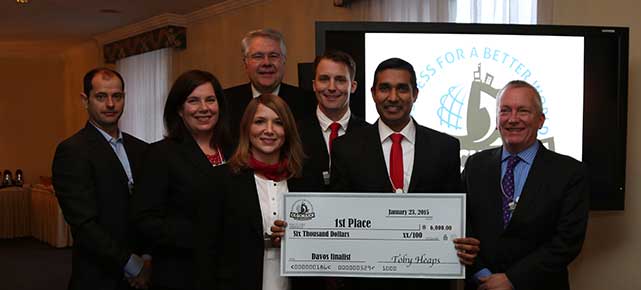DAVOS, Switzerland – Business schools from British Columbia came out on top at this year’s CK-Schulich Business for a Better World case competition held during the World Economic Forum, with teams from the University of Victoria’s Peter B. Gustavson School of Business and Beedie School of Business at Simon Fraser University taking first and second place, respectively.
Third place went to the Schulich School of Business at Toronto’s York University, though competition judge Eric Cornut, chief ethics, compliance and policy officer at Swiss pharmaceutical giant Novartis, said all three presentations were strong.
“It was really impressive. There were lots of good ideas presented here, and we did have a struggle ranking you,” Cornut told the students before the winner was announced. He compared their collective performance to his earlier meetings this month with the prime ministers of Turkey and Russia. “You are by far the most lifting event for me.”
Teams were asked to create a sustainability-driven business plan for Novartis. Their challenge was to identify a wide range of social, environmental and governance metrics to boost Novartis’s standing on the Corporate Knights Global 100 ranking so that the company surpasses its industry peers on sustainability performance.
Twenty-six teams registered to compete in this second-annual competition, which was established as a partnership between Corporate Knights and the Schulich School of Business. Of them, five teams were selected to compete in Round 2 for the chance to present their business plans in Davos in front of a judging panel.
Toby Heaps, chief executive and publisher of Corporate Knights, said this year’s competition was different in many ways from last year’s event, which had students analyzing the business of Calgary-based Suncor Energy.
“Last year, we focused on the energy sector and three non-Canadian teams ended up presenting proposals to a Canadian company,” Heaps said. “This year, we focused on biotech and three Canadian teams presented to a non-Canadian company.”
Heaps said the pharmaceutical industry has sustainability challenges that other industries, such as energy, don’t have. As a result, students were asked to consider metrics and issues beyond the standard environmental, social and governance metrics captured by the Global 100 ranking.
“Access to drugs, particularly in the developing world, is one example of what standard industry metrics don’t capture, and this issue is a growing concern for the pharma sector that needs to be addressed,” Heaps added. “I was happy to see the students tackle this and other challenges head on. This was a thought-provoking day.”
Dirk Matten, a professor of strategy at Schulich who participated as a judge in 2014, said the strong Canadian presence this year is not a surprise.
“One of the reasons has to do with the fact Canadian business schools are very strongly focusing on sustainability and ethics,” Matten said. “If you look at the Green MBA rankings of Corporate Knights or the last Beyond Grey Pinstripes survey by the Aspen Institute, you see that Canadian schools are pounding well above their weight globally.”
The judges chose the team from the University of Victoria for striking what they determined was the right balance between practicality and original thinking that pushed the envelope on sustainability performance.
Team members Karin Feldkamp, Susan Laidlaw, Jesal Shah, and Andrew Spence presented a plan for Novartis to reduce energy use and greenhouse-gas emissions by 50 per cent, reduce water and waste production by 90 per cent, and increase the percentage of women in executive-level positions from zero to 30 per cent – all by 2020.
The team, which won $6,000 for coming in first place, also presents a way for Novartis to broaden its reach in the developing world and increase the effectiveness of its spending on innovation.







